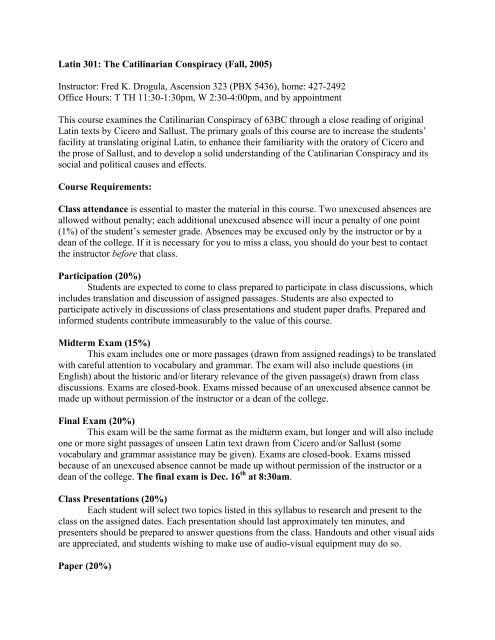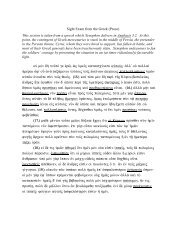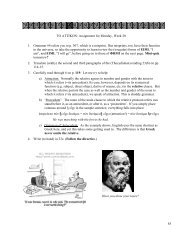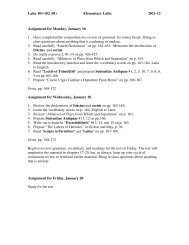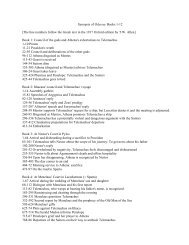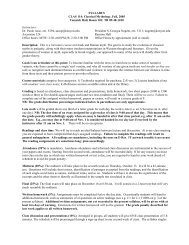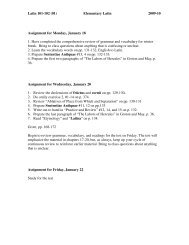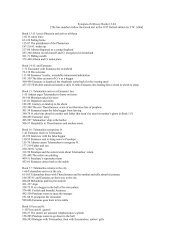Latin 301: The Catilinarian Conspiracy (Fall, 2005 ... - Classics
Latin 301: The Catilinarian Conspiracy (Fall, 2005 ... - Classics
Latin 301: The Catilinarian Conspiracy (Fall, 2005 ... - Classics
You also want an ePaper? Increase the reach of your titles
YUMPU automatically turns print PDFs into web optimized ePapers that Google loves.
<strong>Latin</strong> <strong>301</strong>: <strong>The</strong> <strong>Catilinarian</strong> <strong>Conspiracy</strong> (<strong>Fall</strong>, <strong>2005</strong>)<br />
Instructor: Fred K. Drogula, Ascension 323 (PBX 5436), home: 427-2492<br />
Office Hours: T TH 11:30-1:30pm, W 2:30-4:00pm, and by appointment<br />
This course examines the <strong>Catilinarian</strong> <strong>Conspiracy</strong> of 63BC through a close reading of original<br />
<strong>Latin</strong> texts by Cicero and Sallust. <strong>The</strong> primary goals of this course are to increase the students’<br />
facility at translating original <strong>Latin</strong>, to enhance their familiarity with the oratory of Cicero and<br />
the prose of Sallust, and to develop a solid understanding of the <strong>Catilinarian</strong> <strong>Conspiracy</strong> and its<br />
social and political causes and effects.<br />
Course Requirements:<br />
Class attendance is essential to master the material in this course. Two unexcused absences are<br />
allowed without penalty; each additional unexcused absence will incur a penalty of one point<br />
(1%) of the student’s semester grade. Absences may be excused only by the instructor or by a<br />
dean of the college. If it is necessary for you to miss a class, you should do your best to contact<br />
the instructor before that class.<br />
Participation (20%)<br />
Students are expected to come to class prepared to participate in class discussions, which<br />
includes translation and discussion of assigned passages. Students are also expected to<br />
participate actively in discussions of class presentations and student paper drafts. Prepared and<br />
informed students contribute immeasurably to the value of this course.<br />
Midterm Exam (15%)<br />
This exam includes one or more passages (drawn from assigned readings) to be translated<br />
with careful attention to vocabulary and grammar. <strong>The</strong> exam will also include questions (in<br />
English) about the historic and/or literary relevance of the given passage(s) drawn from class<br />
discussions. Exams are closed-book. Exams missed because of an unexcused absence cannot be<br />
made up without permission of the instructor or a dean of the college.<br />
Final Exam (20%)<br />
This exam will be the same format as the midterm exam, but longer and will also include<br />
one or more sight passages of unseen <strong>Latin</strong> text drawn from Cicero and/or Sallust (some<br />
vocabulary and grammar assistance may be given). Exams are closed-book. Exams missed<br />
because of an unexcused absence cannot be made up without permission of the instructor or a<br />
dean of the college. <strong>The</strong> final exam is Dec. 16 th at 8:30am.<br />
Class Presentations (20%)<br />
Each student will select two topics listed in this syllabus to research and present to the<br />
class on the assigned dates. Each presentation should last approximately ten minutes, and<br />
presenters should be prepared to answer questions from the class. Handouts and other visual aids<br />
are appreciated, and students wishing to make use of audio-visual equipment may do so.<br />
Paper (20%)
Each student will research and write a paper of approximately ten pages on a topic related<br />
to this course and approved by the instructor. Students are expected to meet individually with the<br />
instructor early in the course to develop an acceptable topic. Students are encouraged to pursue<br />
topics in their own fields of interest, including (but not limited to) literary style/usage, social<br />
and/or political history, archaeology, textual transmission, historiography, and law. Each student<br />
must present a draft of their paper to the class on an assigned day for discussion. Final versions<br />
are due at the start of class on December 13th, and each student should retain a copy of their<br />
paper. Papers cannot be handed in later than the due date without permission of the instructor or<br />
a dean of the college.<br />
Paper Presentation (5%)<br />
Students are expected to present a draft of their paper to the class on an assigned date.<br />
Each student should deliver, via email, a copy of their draft to each member of the class<br />
(including the instructor) no later than forty-eight hours before the class in which they will<br />
present their draft. Each presentation should be approximately ten minutes, during which time<br />
the author should summarize their topic and discuss the challenges, surprises, and discoveries<br />
they made during their research. Presenters should be prepared to answer questions from the<br />
class regarding their drafts, and the class is expected to have thoughtful comments and critiques<br />
to assist the author in improving their paper.<br />
Special Accommodations:<br />
If you have a physical, psychological, medical, or learning disability which may impact<br />
your ability to carry out the requirements of this course as stated herein, you should contact Erin<br />
Salva (salvae@kenyon.edu) in the Office of Disability Services at PBX 5145 as soon as possible.<br />
Accommodations will be given in this course only with notification from the Coordinator of<br />
Disability services.<br />
Academic Honesty:<br />
All students are responsible for understanding—and adhering to—the College rules on<br />
academic honesty and plagiarism. If you are at all uncertain about these regulations, including<br />
the definition of plagiarism, you must consult the relevant sections in the Student Handbook.<br />
Required Books:<br />
Frerichs, K. Cicero’s First <strong>Catilinarian</strong> Oration.<br />
Ramsey, J. T. Sallust’s Bellum Catilinae.<br />
Schedule of Classes and Assignments (subject to change):<br />
Tuesday, August 30: Introduction.<br />
Thursday, September 1: Sallust, BC sections 1-2 [35]<br />
Tuesday, September 6: Sallust, BC 3-5 [47]<br />
Thursday, September 8: Sallust, BC 6-9 [61]<br />
Presentation: Who was Sallust?
Tuesday, September 13: Sallust, BC 10-13 [59]<br />
Presentation: Literary motif of Rome’s decline<br />
Thursday, September 15: Sallust, BC 14-17 [62]<br />
Presentation: Textual transmission of Sallust’s text<br />
Tuesday, September 20: Sallust, BC 18-20 [71]<br />
Presentation: First <strong>Catilinarian</strong> <strong>Conspiracy</strong><br />
Thursday, September 22: Sallust, BC 21-24 [52]<br />
Presentation: Career of Cicero<br />
Tuesday, September 27: Sallust, BC 25-29 [60]<br />
Presentation: Roman elections<br />
Thursday, September 29: Sallust, BC 30-33 [70]<br />
Tuesday, October 4: Sallust, BC 34-37 [65]<br />
Thursday, October 6: Sallust, BC 38-41 [56]<br />
Tuesday, October 11: Reading Day.<br />
Thursday, October 13: Sallust, BC 42-45 [52]<br />
Tuesday, October 18: Midterm Exam<br />
Thursday, October 20: Sallust, BC 46-49 [78]<br />
Presentation: Caesar’s career to 63 BC<br />
Tuesday, October 25: Sallust, BC 50-51 [121]<br />
Presentation: Caesar’s speech<br />
Thursday, October 27: Sallust, BC 52 [91]<br />
Presentation: Cato’s career and family<br />
Tuesday, November 1: Sallust, BC 53-58 [116]<br />
Thursday, November 3: Sallust, BC 59-61 [52]<br />
Introduce Cicero<br />
Tuesday, November 8: Cicero Cat. lines 1-27 [27]<br />
Introduction pp. xiv-xvii, learn terms<br />
Presentation: Development Roman oratory<br />
Presentation: Aspects of Roman oratory<br />
Thursday, November 10: Cicero Cat. lines 28-54 [26]<br />
Presentation: Legality of capital punishment<br />
Tuesday, November 15: Cicero Cat. lines 55-92 [37]<br />
Read handout<br />
Presentation: Compare Catiline and Sulla<br />
Thursday, November 17: Cicero Cat. lines 93-141 [48]<br />
Read handout
Presentation: Compare Catiline and Caesar<br />
Tuesday, November 22:<br />
Thursday, November 24:<br />
Thanksgiving Break.<br />
Thanksgiving Break.<br />
Tuesday, November 29: Cicero Cat. lines 142-179 [37]<br />
Read colleagues’ paper drafts<br />
Discussion #1 of paper drafts<br />
Thursday, December 1: Cicero Cat. lines 180-226 [46]<br />
Read colleague’s paper drafts<br />
Discussion #2 of paper drafts<br />
Tuesday, December 6: Cicero Cat. lines 227-262 [35]<br />
Thursday, December 8: Cicero Cat. lines 263-299 [36]<br />
Tuesday, December 13: Cicero Cat. lines 300-317 [18]<br />
Papers are due at start of class<br />
Discuss Final Exam<br />
Class Presentation Topics:<br />
Each student should do two presentations, but each topic may be done only once. Presentations<br />
should be around ten minutes long, and no longer than fifteen minutes. Handouts are appreciated,<br />
but not required. <strong>The</strong> questions below are intended to help guide the student in their thinking<br />
about a topic, but I am most interested in seeing students get involved in a question or topic and<br />
find something truly interesting to say about it. Students are welcome to do additional reading on<br />
a given topic, but they should be sure to incorporate the readings assigned to each topic.<br />
Students should consult the Oxford Classical Dictionary for all presentations, and commentaries<br />
on Sallust and Cicero’s works may be useful.<br />
9/8: Who was Sallust? What were his politics and what was his career like? To whom was he<br />
favorably disposed, and whom did he dislike? What kind of biases did he harbor? What should<br />
we bear in mind when reading his account of the <strong>Catilinarian</strong> <strong>Conspiracy</strong>?<br />
Read: S. Handford, Sallust (Penguin edition) pp. 7-11; M. Grant, <strong>The</strong> Ancient Historians pp.<br />
195-213; Mellor, <strong>The</strong> Roman Historians, pp. 30-38.<br />
9/13: Literary motif of Rome’s decline: when were the “good days” of Rome? Why do authors<br />
portray Rome in decline? Why has Rome become “worse”? What—in Sallust’s opinion—made<br />
Rome great, and what led to its decline?<br />
Read: Sallust, Cat. 5-13, 36-39; McGushin, Sallust: <strong>The</strong> <strong>Conspiracy</strong> of Catiline pp. 13-19.<br />
9/15: Textual transmission of Sallust’s text. What is the recoverable history of Sallust’s account<br />
of the <strong>Catilinarian</strong> <strong>Conspiracy</strong>? How does an ancient text survive from antiquity?<br />
Read: See instructor.
9/20: First <strong>Catilinarian</strong> <strong>Conspiracy</strong>: what was it? What happened? Who was involved and how<br />
do we know?<br />
Read: Sallust, Cat. 18; Suetonius, Life of Julius Caesar 9; Dio Cassius 36.44.3-5; Cicero, Against<br />
Catiline 1.15; Hardy, <strong>The</strong> <strong>Catilinarian</strong> <strong>Conspiracy</strong> 1-11.<br />
9/22: Career of Cicero: what had his career been like up to 63 BC? What parts of his career were<br />
typical of a Roman aristocrat, and what was atypical? What difficulties did he encounter, and<br />
how did he overcome these? How did he compare with other consuls?<br />
Read: Frerichs p. viii; Plutarch, Life of Cicero (skim).<br />
9/27: Roman elections: how did they work? What could influence elections, and how did this<br />
happen? Were elections “fair” or “democratic”? Why did Catiline lose two consular elections?<br />
How hard was it to win a consulship? Should Catiline have won?<br />
Read: A. Lintott, <strong>The</strong> Constitution of the Roman Republic pp. 40-63, Abbott, Roman Political<br />
Institutions 253-59.<br />
10/20: Caesar’s career to 63 BC: who was he in 63BC? Was he already exceptional, or simply<br />
one of many Roman aristocrats? Has his early career marked him as an unusual and worrisome<br />
type of Roman politician, or is Sallust writing with an eye on Caesar’s later accomplishments?<br />
Why does he stand out in this account?<br />
Read: Plutarch, Life of Caesar; Suetonius, Life of Julius (first sections only).<br />
10/25: Caesar’s speech: what about his speech and proposals is expected, and what is unusual?<br />
Was he friendly, hostile, or neutral to Catiline? What relationship, if any, is thought to have<br />
existed between Caesar and Catiline, and what light does Caesar’s speech shed upon that<br />
relationship?<br />
Read: A. Kaplan, Catiline pp. 70-76, Hardy, <strong>The</strong> <strong>Catilinarian</strong> <strong>Conspiracy</strong> 90-94, consider<br />
readings from 9/20 report.<br />
10/27: Cato’s career and family: who was Cato, and why does Sallust highlight his speech? Why<br />
is he so stern and harsh? How is he different from the more typical Roman aristocrats? Why is he<br />
compared with Caesar? What does Cato represent to the Romans?<br />
Read: Plutarch, Life of Cato the Younger (first sections only).<br />
11/8: Development Roman oratory: how and why did oratory develop in the Late Republic? Why<br />
was oratory becoming increasingly important in Roman politics? How was oratory used, and<br />
what advantages could one acquire is they were good orators? How did one acquire this skill?<br />
Was it a traditional or innovative skill?<br />
Read: Frerichs pp. xiv-xv; F. Millar, <strong>The</strong> Crowd in Rome in the Late Republic pp. 73-93<br />
11/10: Legality of capital punishment: what was the senate’s “final decree” (senatus consultum<br />
ultimum)? What authority did it convey? How was the execution of a Roman citizen authorized<br />
in the Republic? Were Caesar’s and Cato’s proposals legal, or merely expedient? Why doesn’t<br />
Cicero simply execute Catiline if he is so certain of Catiline’s guilt?<br />
Read: Kaplan, Catiline pp. 78-84; Abbott, Roman Political Institutions 229-30, 240-243.
11/15: Compare Catiline and Sulla: how did the career of L. Cornelius Sulla influence the career<br />
of Catiline? Was Sulla a good or bad role model? Why didn’t more Roman aristocrats follow<br />
Sulla’s model? How did Sulla’s career foreshadow the <strong>Catilinarian</strong> <strong>Conspiracy</strong>?<br />
Read: Plutarch, Life of Sulla.<br />
11/17: Compare Catiline and Caesar: were these men similar or different in the years leading up<br />
to 63BC? What did their respective prospects look like around 70-65BC? Why did Catiline fail<br />
to obtain supreme power in Rome while Caesar succeeded? Did the men follow different<br />
political strategies, or was Caesar simply luckier than Catiline?<br />
Read: Plutarch, Life of Caesar.


